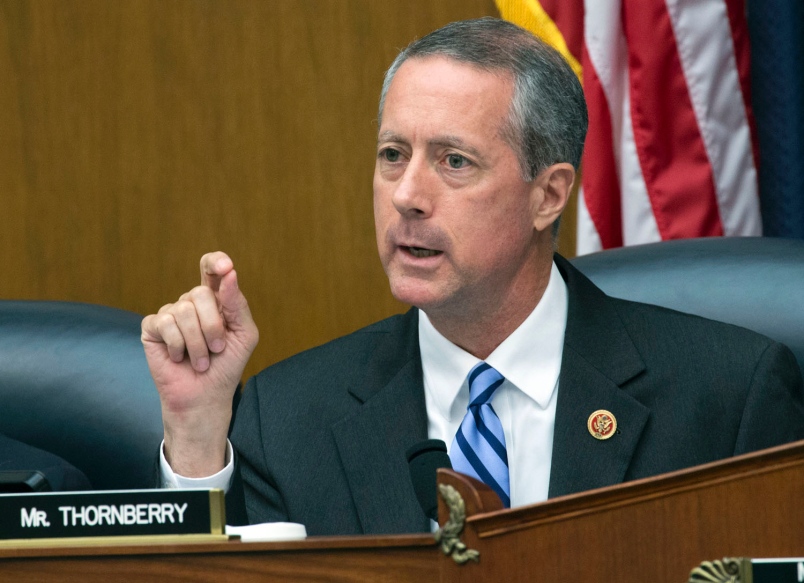
CAPITOL HILL: Can Congress finally break the logjam of the Budget Control Act and increase spending on defense? Yes we can, said the cautiously optimistic chairman of the House Armed Services Committee. Why are the chances any better this year than for all the failures since 2011? Because, Rep. Mac Thornberry told reporters this morning, Donald Trump is shaking up the status quo in a way that opens up new possibilities.
“I think we have a tremendous opportunity to do the right thing,” said Thornberry. “There’s more of the federal budget being looked at, in play if you will, than has been the case for many years.”
“Unlike previous years,” Thornberry explained, “you have a Congress and administration who are looking at the big budget picture”: repealing Obamacare, cutting Medicare, cutting Medicaid, reforming taxes (i.e. to raise revenue) — and, though the conservative Thornberry didn’t mention this option, increasing deficit spending. All these things intertwine because defense is a relatively small share of federal spending — only 14.7 percent, said Thornberry — so a small percentage cut to entitlements — or a small increase in taxes — could pay for a big percentage increase in defense.
At the Republicans’ recent retreat in Philadelphia, “there was no disagreement at all that we need to increase defense spending,” Thornberry said. Admittedly, “other people pointed out that we need to also pay attention to the bigger budget picture,” Thornberry said. “I would just say, we cannot wait to fix our airplanes until we get all our budget problems solved…There’s lots of agreement on that.”
The soft-spoken Thornberry is here downplaying the bitter divide within the Republican Party. The traditional Reaganesque defense hawks — like Thornberry or his Senate counterpart John McCain — have pushed to repeal the Budget Control Act spending caps, at least for defense. (The BCA does not cover entitlements). The new wave of Tea party deficit hawks — like Trump’s nominee for budget director, Mick Mulvaney — have seen the BCA as a bulwark against excessive federal spending.
Meanwhile, the Democrats have argued any increase in the BCA cap for defense must be met with an equal increase in non-defense spending, a stance which Thornberry called “one of the worst things that’s happened in recent years.” GOP deficit hawks might accept such a one-for-one compromise, but deficit hawks see it as just doubling the damage, so there’s never been the necessary 60-vote supermajority in the Senate to repeal the Budget Control Act.
“It’s got to be changed,” Thornberry said of the BCA. “I can’t tell you what date or legislative vehicle will do so.”

$18 Billion Wishlist
In the nearer term, Thornberry desperately wants to pass the defense spending bills for 2017; the ’17 fiscal year is already one-third over. “There is no reason in the world we need to wait till April,” when the current ad hoc spending measure expires, he said.
Thornberry is also looking forward expectantly to the Trump Administration’s promised request for supplemental spending in 2017, expected to come around March 1st. He’s already got an $18 billion wishlist.
“The place where I have suggested that the administration start is look at the items that were in the House-passed NDAA (National Defense Authorization Act) last year but that ultimately did not make into the final conference report that was signed into law,” Thornberry said. “My view is they should be at the top of the list.” The final 2017 bill focused on readiness and personnel plus-ups but demurred on the many modernization initiatives, like buying extra fighter aircraft, that make up most of the omitted $18 billion.
“One of the only ways we’re going to fix some of the readiness issues we have is modernization,” Thornberry said. “if you’ve got an F-18 that was built in 1980, you’re going to have a problem keeping that flying until you replace it with an F-35.” (Donald Trump has famously hammered the F-35 on Twitter and in pre-inauguration meetings with contractor Lockheed Martin).
Thornberry also pledged to keep pursuing defense reform, particularly streamlining Pentagon bureaucracy to encourage innovation. In Thornberry’s view, reforming the acquisition process isn’t just about saving money — though that’s important — but also about getting the best technology to US troops as fast as possible.
The Obama administration pushed hard for innovation too, particularly under Defense Secretary Ash Carter — who’s since departed — and Deputy Secretary Bob Work — who’s staying indefinitely to help with the transition. What about Carter and Work’s initiatives?
“Force of the Future got a bad rap and probably wasn’t thought through adequately,” Thornberry said of Carter’s effort to create more flexibility in Pentagon personnel practices — but the goal was good, he added. Likewise, other Carter-era innovation initiatives showed promise, even if specifics might need to change.
“I think the intentions and goals behind those things was absolutely right on,” Thornberry said. “Are the specific programs something that have to be preserved under that name, under that rubric? Well, maybe not necessarily.”
“I think the sorts of technologies we are looking at in Third Offset are some of the right ones,” Thornberry said of Work’s brainchild, which focuses on military applications of computer networks, robotics, and artificial intelligence. “I think outreach to Silicon valley and others is a good thing,” Thornberry continued. “There are a variety of ways to do that so we’ll look at DIU(X),” Carter’s Defense Innovation Unit (Experimental) outposts in Palo Alto, Boston, and beyond.
“I said when I became chairman (that) defense reform will be a central part of my agenda as long as I’ve got this job because the world is too moving fast, technology is moving too fast, for us to be complacent,” Thornberry said. “I really look forward to working with Sec. (James) Mattis and his new team there— once he has a team there — (but) I feel strongly that, many times, essential reforms will only come from Congress. There’s just a limit to how much an institution can do to reform itself.”
“Nobody has more respect and admiration for Sec. Mattis than I do, but he’s got a messy world” to manage, Thornberry added.
And the US must play a leading role around the globe, Thornberry emphasized. “We have a unique role to play in the world,” he said. “There were elements in both presidential campaigns that implied we should walk back from that.”
“We have all come to take for granted the special contributions the United States has made” to global peace and prosperity, Thornberry said. “To walk away from that would be a dangerous, bad thing for us and for others.”

